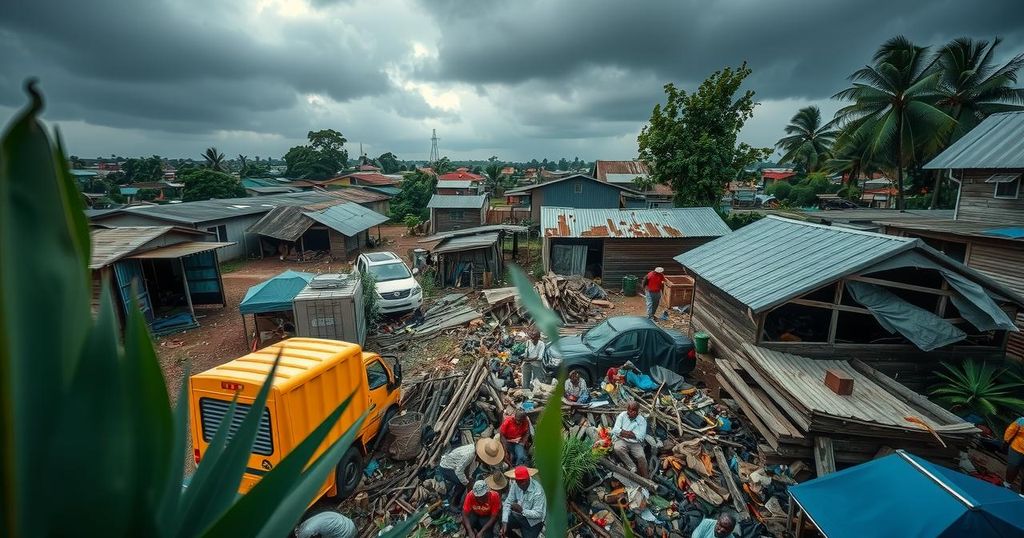Zimbabwe’s Journey of Recovery Post-Cyclone Idai: A Story of Resilience

After Cyclone Idai devastated eastern Zimbabwe in March 2019, CARE has aided over 300,000 affected individuals by providing essential resources. Mwaedza, a survivor from the cyclone, shared her harrowing experience of loss and displacement. Through CARE’s shelter project, she has rebuilt her home, restoring her sense of safety and hope for the future. This situation illustrates the resilience of individuals and the ongoing need for support in disaster recovery efforts.
CARE has significantly impacted over 300,000 individuals affected by Cyclone Idai, offering essential support such as food, water, education, shelter, and drought-resistant seeds. The devastating cyclone in March 2019 caused considerable destruction across eastern Zimbabwe, displacing nearly 60,000 people and leading to over 340 fatalities. The damage was estimated at $622 million, with recovery efforts projected to require a staggering $1.1 billion.
One of the hardest-hit individuals, Mwaedza, age 65, vividly recounts the harrowing night when the cyclone struck. Her home in Chipinge district was severely damaged, forcing her to flee to her ancestral home in Mabhiza with her family. During her arduous journey, she experienced challenges such as food scarcity and reliance on the generosity of others. Mwaedza faced significant hardship while living in a makeshift structure under harsh conditions. Nevertheless, she received assistance from neighbors, who provided crucial materials to help rebuild her home, sparking a glimmer of hope.
Substantial aid arrived through CARE’s recently initiated shelter project funded by the Volant Charitable Trust, aimed at enhancing shelter preparedness in Zimbabwe, particularly in disaster-prone areas like Manicaland. “When they told me they were building us a house, I couldn’t believe it,” Mwaedza expressed joyfully as her new home neared completion. This project involved community engagement to design quick-response housing solutions for future emergencies.
With her new house finally complete, Mwaedza feels an overwhelming sense of relief and optimism, saying, “Now, for the first time in years, my son can sleep indoors. The relief I feel is indescribable.” The transformation in her living situation has not only restored her physical dwelling but also her sense of security and hope.
Despite the ongoing challenges of financial strain and food insecurity faced over the past five years, Mwaedza’s journey exemplifies resilience and the human spirit. “This house is more than just a shelter,” she remarked. “It is a symbol of hope, a sign that we can overcome anything with the right support.” The cyclone underscored the vulnerability to natural disasters but also highlighted the potential for recovery and rebuilding, especially with adequate support. This narrative serves as a reminder of the importance of continuous action and funding to assist families affected by such calamities, ensuring that they can rebuild and secure a stable future amidst a landscape marked by climate uncertainties.
The aftermath of Cyclone Idai in March 2019 left a significant mark on Zimbabwe, affecting thousands of lives through destruction and displacement. Approximately 340 lives were lost, with extensive damage to infrastructure, homes, and farms. Recovery efforts have been estimated to require billions in funding to restore the livelihood of impacted communities. Organizations like CARE stepped in to provide essential aid, focusing on long-term recovery and rebuilding strategies for underserved populations. Mwaedza’s story illustrates the human toll of the cyclone and the resilience found within communities striving for a better future amidst adversity.
In conclusion, the story of Mwaedza and the broader impacts of Cyclone Idai showcase not only the destructive force of natural disasters but also the profound resilience of individuals in their wake. CARE’s initiatives highlight the necessity for ongoing support and the importance of community involvement in recovery efforts. As Mwaedza prepares for future storms with renewed confidence and hope, her journey serves as a beacon for others facing similar challenges, emphasizing the critical need for adequate disaster preparedness and recovery funding to help families rebuild their lives sustainably.
Original Source: www.care.org







